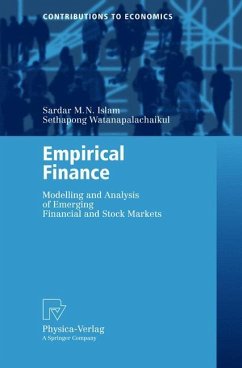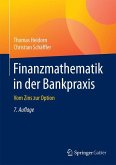The emphasis of this book is on understanding special characteristics of the financial systems of emerging markets, where the existence of market imperfections such as asymmetric information, adverse selection and moral hazard can cause financial market failures. Considering the Thai stock market as an example, this book provides an econometric study of a typical Asian financial system. Many contemporary techniques and models are used in this study, including simple multivariate regression, multi-factor model, exponential smoothing, Holt Winter's models, and GARCH type models. The findings of the existence of rational bubbles, anomalies, volatility and other characteristics reveal evidence of inefficiency in the Thai stock market. Based on these results, the book includes justifications for public policies in such economies and makes suggestions for further research areas.
This book makes two key contributions to empirical finance. First it provides a comprehensive analysis of the Thai stock market. Second it presents an excellent exposition ofhow modem econometric techniques can be utilised to understand a market. The increasing globalisation of the world's financial markets has made our un derstanding of the risk-return relationship in a broader range of markets critical. This is particularly so in emerging markets where market depth and liquidity are major issues. One such emerging market is Thailand. The Thai capital market isof particular interest given that it was the market in which the Asian financial crises commenced. As such an understanding ofthe Thai capital market via study of the pre and post-crisis periods enables one to shed light on one of the major financial markets events of recent times. This book provides a quantitative analysis of the Thai capital market using some very useful and recent econometric techniques. The book provides an over view of the Thai stock market in chapter 2. Descriptive statistics and time series models (moving average, exponential smoothing, ARIMA) are presented in chap ter 3 followed by market efficiency tests based on autocorrelations in chapter 4. A richer set of models is then considered in chapters 5 through 8. Chapter 5 finds a cointegrating relationship between macroeconomic factors and stock returns.
This book makes two key contributions to empirical finance. First it provides a comprehensive analysis of the Thai stock market. Second it presents an excellent exposition ofhow modem econometric techniques can be utilised to understand a market. The increasing globalisation of the world's financial markets has made our un derstanding of the risk-return relationship in a broader range of markets critical. This is particularly so in emerging markets where market depth and liquidity are major issues. One such emerging market is Thailand. The Thai capital market isof particular interest given that it was the market in which the Asian financial crises commenced. As such an understanding ofthe Thai capital market via study of the pre and post-crisis periods enables one to shed light on one of the major financial markets events of recent times. This book provides a quantitative analysis of the Thai capital market using some very useful and recent econometric techniques. The book provides an over view of the Thai stock market in chapter 2. Descriptive statistics and time series models (moving average, exponential smoothing, ARIMA) are presented in chap ter 3 followed by market efficiency tests based on autocorrelations in chapter 4. A richer set of models is then considered in chapters 5 through 8. Chapter 5 finds a cointegrating relationship between macroeconomic factors and stock returns.
Review
"This new book by Sardar M. N. Islam and Sethapong Watanapalachaikul applies the modern tools of financial econometrics to the investigation of the structure and statistical relationships within an important developing financial market, the stock market in Thailand. This book is an invaluable source for those with an interest in the financial markets of developing economies, financial econometrics and modelling more generally and also provides a framework for the investigation of these same relationships in those other financial markets at different stages of development."
- Jonathan Batten, Professor of Finance, Seoul National University, Republic of Korea; Co-editor, Research in International Business and Finance; in the editorial board of the International Review of Financial Analysis; ,coauthor with Thomas Fetherston, "Asia-Pacific Fixed Income Markets: An Analysis of the Region's Money, Bond and Interest Derivatives Markets", John Wiley, Frontiers in Finance Series in 2002.
"This new book by Sardar M. N. Islam and Sethapong Watanapalachaikul applies the modern tools of financial econometrics to the investigation of the structure and statistical relationships within an important developing financial market, the stock market in Thailand. This book is an invaluable source for those with an interest in the financial markets of developing economies, financial econometrics and modelling more generally and also provides a framework for the investigation of these same relationships in those other financial markets at different stages of development."
- Jonathan Batten, Professor of Finance, Seoul National University, Republic of Korea; Co-editor, Research in International Business and Finance; in the editorial board of the International Review of Financial Analysis; ,coauthor with Thomas Fetherston, "Asia-Pacific Fixed Income Markets: An Analysis of the Region's Money, Bond and Interest Derivatives Markets", John Wiley, Frontiers in Finance Series in 2002.









